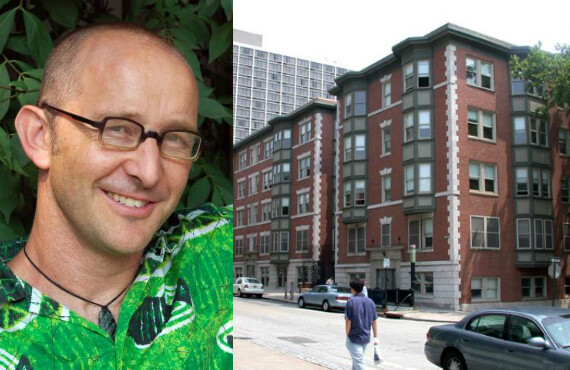A Tale of One Family in Penn’s Kings Court English College House
One of a series of articles about families living in the University of Pennsylvania’s College House system.
Living alongside the more than 300 undergraduate students in Kings Court English College House at the University of Pennsylvania there are a handful of families who embrace the residents as if they were their own relatives.
Among these is Campbell Grey, an Australian native and an associate professor of classical studies in the School of Arts & Sciences, and his wife, Ann, the associate director for research in Penn’s Center for Undergraduate Research. The couple met at the University of Cambridge, while completing their doctorates, and since 2006 they have lived in Kings Court English.
As resident faculty fellows, they and other Kings Court English residential staff manage academic and social programming, invite guest speakers, foster a sense of community and host informational events that help the students to develop and grow as adults.
Campbell Grey says, “Our house isn’t just a dorm, it’s a neighborhood, or an extended family.”
As such, the Greys invite residents into their apartment for dessert and cookie nights, Sunday morning brunches and workshops about cricket and Australian-rules football watching. They’ve also hosted movie screening parties in their apartment and in Kings Court English’s courtyard garden.
Like the garden, the Grey family has flourished there. Both of the their children, Isabel, 6, and six-month-old Connor, were born while living there.
“It is a huge, nourishing, multicultural family for our children to thrive in,” Grey says.
He says there are many great things about living as a family in the College House and notes that the vibrant, diverse KCEH community with its open and friendly atmosphere and mix of students, security staff, cleaning personnel, cafeteria workers and others. He says it is the only environment the children have ever known.
“Our kids are exposed to a huge variety of cultures, languages and backgrounds,” says Grey. “It’s a safe place to raise children. Everybody knows our kids, and they’re perfectly at home roaming all over.
“The accessibility of campus life, with its myriad events, shows and activities is both a boon and a horizon-expander. Where else could you attend a swing-dancing show, an Indian music concert and African dance, then cheer on your favorite tennis players and support your local rugby team, all within half a mile of home and for next to nothing?”
He says their daughter, Isabel, is confident, articulate and comfortable in company and feels as though she has 300 older cousins and friends. Their son, Connor, is sometimes passed around from student-to-student over dinner gatherings and is also comfortable in crowds.
“I don’t know whether they are developing at a faster rate than they would if we didn’t live here, but I do feel like our daughter carries herself with a maturity and self-possession that is partly due to the fact that a whole bunch of adults treat her as an adult and interact with her in a positive and supportive way,” Grey says. “It’s an extremely nourishing and positive experience for our kids.”
The Grey family spends time with other families who live on campus and says there’s a great sense of community among the College House families. They see each other regularly, at formal events and as part of their everyday lives as neighbors. They’re all friends and their children are friends, too.
For the students residing in Kings Court English, Grey says he hopes that his family represents some sort of stability, especially for students who are freshmen.
“For some, it’s important to feel like there is some normal family life happening alongside the crazy of college life,” he says. “We try to be accessible for those who have concerns or problems or need advice on anything from classes to relationships to summer plans to careers or where to take their parents for a special dinner.”
But, there’s much more to it, Grey says.
“I also hope that we can be some partial model of how you might integrate, manage or balance your professional life and your private domestic life, which, as young adults moving out into the world, some of them are thinking about,” Grey says. “The families that live in the college houses are pretty diverse, and collectively we are a little bit different from the adults and children that our residents might have been used to interacting with as they grew up. So, ideally, engaging with both us and our children expands and extends our residents’ experiences.”








